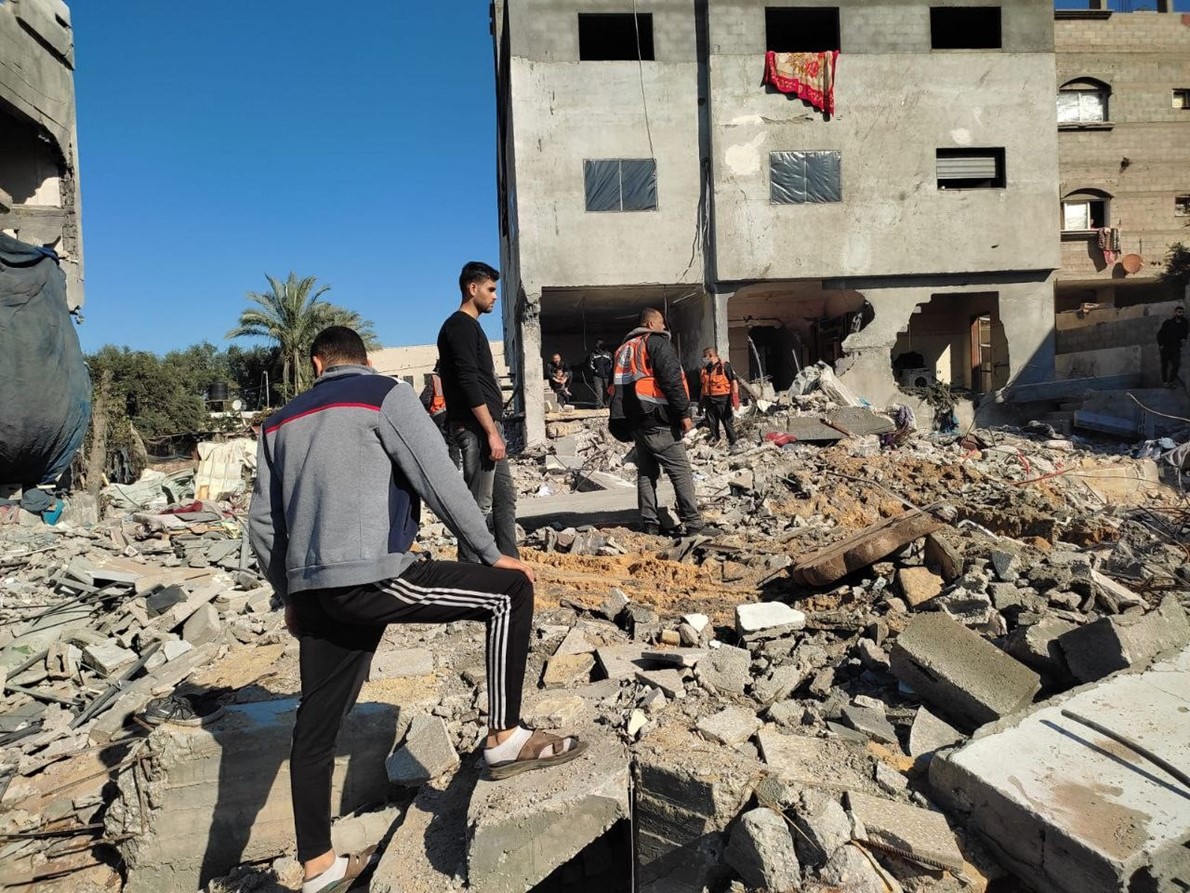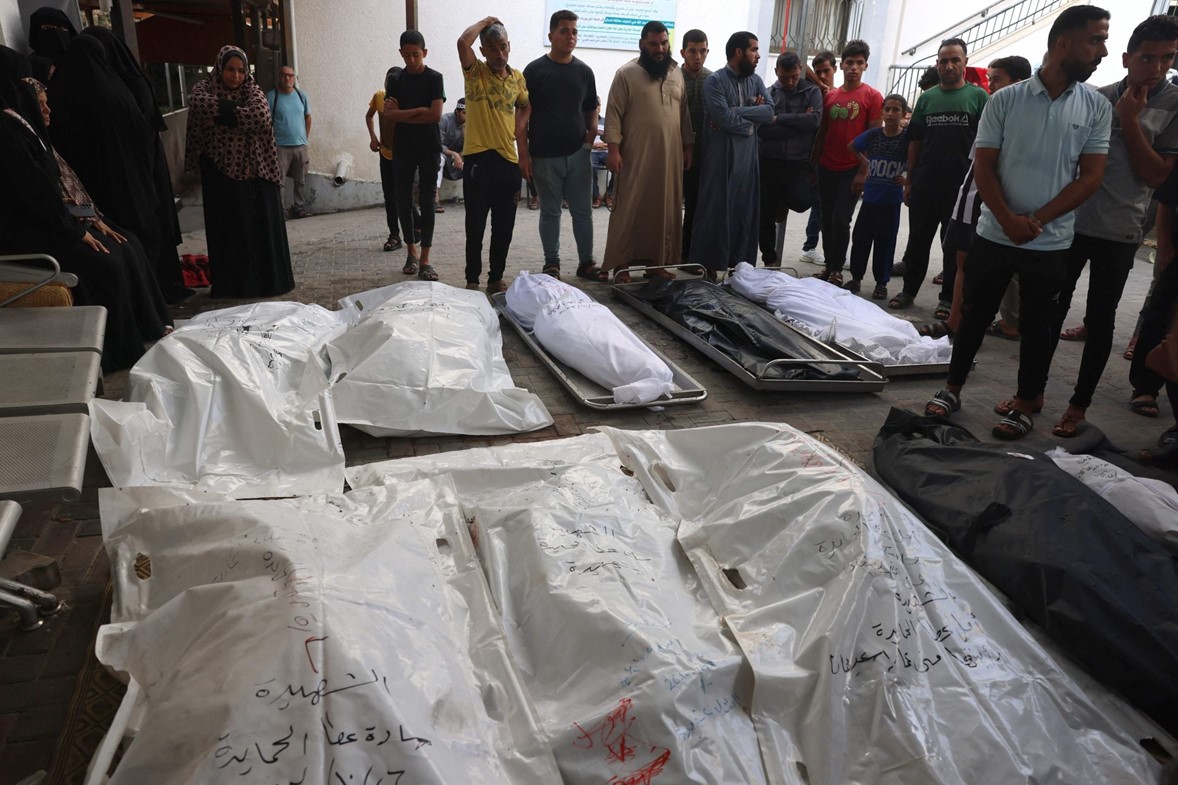GAZA – Since Oct. 7, the
Israeli Occupational Forces (IOF)
have been advancing into southern Gaza territories, lacking a clear and precise
objective as they continue to conduct collective punishment against
Palestinians, reported Al-Ghad.
اضافة اعلان
Despite Israeli claims that they only intend to target
Hamas, the failure to distinguish between Hamas and civilians raises legitimate
questions about the government's true intentions and raises fundamental ethical
issues.
The aggression, now reaching 78 days, demonstrates that
Israel is incapable of destroying Hamas. In fact, the
resistance movement may
be stronger now than before.
Signs of Israel’s strategic failure have already begun to
emerge. The collective punishment of civilians has not convinced the people of
Gaza to withdraw their support for Hamas. On the contrary, it has heightened
feelings of resentment and anger among Palestinians.

Israel is not the first country to make the mistake of
relying excessive airstrikes as other countries have historically bombed their
enemies to break morale and push populations to rebel against their
governments. However, history shows that broad-scale bombing of civilian areas
rarely achieves this objective.
This strategy reached its peak in
World War II, conducting
the indiscriminate bombing of cities such as Hamburg, with 40,000 casualties,
Darmstadt, with 12,000 casualties, and Dresden, with 25,000 casualties.
Additionally, Israel continuously aims attacks on hospitals,
schools and refugee camps, claiming they are Hamas base camps. This is
reminiscent of the British Royal Air Force’s airstrike that was meant for
Gestapo headquarters in Copenhagen, resulting in the deaths of dozens of school
children.
In Germany, the bombing campaign by the Allies in 1942
caused significant harm to civilians, destroying urban areas one after another.
The total number of German cities and towns destroyed reached 58 by the end of
the war. However, it did not weaken the morale of civilians or lead to a revolt
against Adolf Hitler, contrary to the Allies' expectations. Instead, this
campaign encouraged Germans to fight tenaciously out of fear.
Similarly, the
Nazis' attempt to use the same approach
failed as well.
German air raids on British cities between 1940 and 1941
resulted in the deaths of over 40,000 people. Instead of crushing morale, these
bombings spurred the British and their American and Soviet allies to coordinate
extensive efforts, ultimately leading to a counterattack.

The war in Ukraine is the latest example of this. For almost
two years, Russia sought to subdue Ukraine by launching wave after wave of
destructive airstrikes on cities across the country, resulting in the deaths of
over 10,000 civilians, the destruction of over 1.5 million homes and the
displacement of around eight million Ukrainians. While Russia aims to break
Ukraine, collective punishment of civilians has convinced Ukrainians to resist
Russia more resolutely than ever.
Similarly, the exact course of events is occurring in Gaza
today. Despite nearly two months of intensive military operations, Israel has
achieved measly progress.
Israeli airstrikes and ground operations have reportedly
killed up to 5,000 out of an estimated total of 30,000 Hamas fighters,
according to the IOF. Even worse, they admit that the number of
civilians killed is twice the number of Hamas casualties.
In fact, research shows that collective punishment on
civilians breeds future resistance fighters. A research paper written by
Lebanese anthropology professor, Ghassan Hage, shows that the primary
demographic of suicide bombers and resistance fighters are orphaned men. These
fighters are also usually born into refugee camps within Palestine.
“Palestinians consider as one of the main factors behind the
rise of suicide bombings: colonial humiliation,” says Hage “the experience of
having another nation enter your territory at will, arrest your leaders, and
talk about them as if they were disposable entities is clearly and
significantly humiliating. It is also experienced at a personal level: being
shouted at, abused, searched, stopped, ordered around, checked, asked to wait,
‘allowed to pass,’ and so forth.”
In other words, there is no doubt that Israel is creating
resistance in numbers, exceeding those it kills. The death of civilians pushes
family and friends to join the resistence.
Moreover, although the military infrastructure of Hamas is
modest, it has not been tangibly dismantled yet.
The IOF conducted operations on
Al-Shifa Hospital, claiming
that is was a Hamas operations base. Seizing several Hamas tunnels and
destroying them, as shown in videos released by the occupation. However, these
entrances can be repaired in the same way they were initially constructed.
Moreover, it seems that Hamas fighters had left the tunnels
before the IOF entered them, presumably surviving the attack all in all.
Furthermore, Hamas has an advantage over the occupation as
its fighters can cease operations, blend into civilian populations and survive
to fight again in better conditions.
On a broader scale, the IOF has not succeeded in weakening
Hamas's control. Israel has singlehandedly released only one Israeli prisoners
out of 240. The rest were released under Hamas’ terms.

Additionally, Hamas has proven to the occupation that they
maintain control over northern Gaza, despite what they might think.
Earlier, Al-Ghad reported on Hamas’ humiliation of the IOF
through their release of hostages in north of the strip, as opposed to the
south. The IOF has previously boasted about their complete siege of northern
Gaza, claiming Hamas no longer exists there. However, during the November
ceasefire and prisoner exchange, Hamas asserted their unfaltering presence in
the north by surprising the occupation with their prisoners.
This indicates that the movement still has the ability to
manage and control Gaza.
Also, despite the energy and internet cut-off throughout
Gaza, Hamas continues to produce videos showing the atrocities committed by the
IOF against civilians, as well as the battles between Hamas fighters and the
Israeli forces.
Simultaneously, Hamas updates 620,000 subscribers on their
widely circulated channel on the Telegram messaging app. Hamas published nearly
200 videos and announcements per week between Oct. 11 and Nov. 22 through that
channel
Moreover, in a poll conducted by the
Arab World Center for Research and Development (AWRAD) in Gaza and the West Bank, 76 percent of those
surveyed expressed a positive view of Hamas.
Results from the poll also imply that 500,000 Palestinian
men aged 18 to 34 are willing to join Hamas or other Palestinian groups
fighting for their homeland and resisting the occupation, supporting Hage’s
research.
This is exacerbated as almost every year since the early
1980s, the number of Israeli settlers in Palestinian territories has
continuously increased. The growth of settlements means the loss of land for
Palestinians and increased anxieties of Israel seizing more land.
The growth of the
Israeli population in Palestinian
territories plays a crucial role in inflaming the resistance. Thus, the Hamas
movement emerged in 1987. after the Israeli population had significantly
infiltrated Palestinian land and displaced hundreds of thousands of
Palestinians.
Therefore, according to numerous analysts and war scholars,
the only way to defeat Hamas is through a political division between them and
the Palestinian people. As well as declare that it has decided to immediately
halt the construction and expansion of Jewish settlements in the West Bank as
an initial guarantee of its commitment to the two-state solution.
Additionally, a sustainable long-term plan would be for the
White House to facilitate an open discussion on Israel's conduct in Gaza. This
discussion can pave the way for the study of alternative strategies.
A serious Israeli commitment to a new future can change the
framework of Israeli-Palestinian dynamics, and provide Palestinians with a real
alternative to Hamas. In return, Israelis will gain more security. Finally,
both parties will follow the path leading to potential harmony.
Read more Region and World
Jordan News



